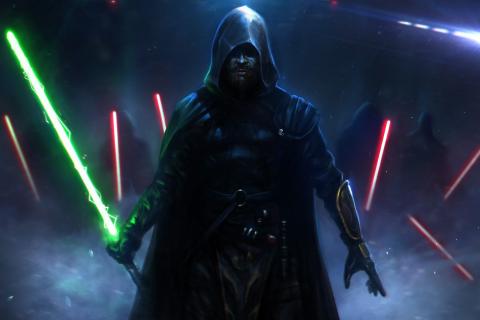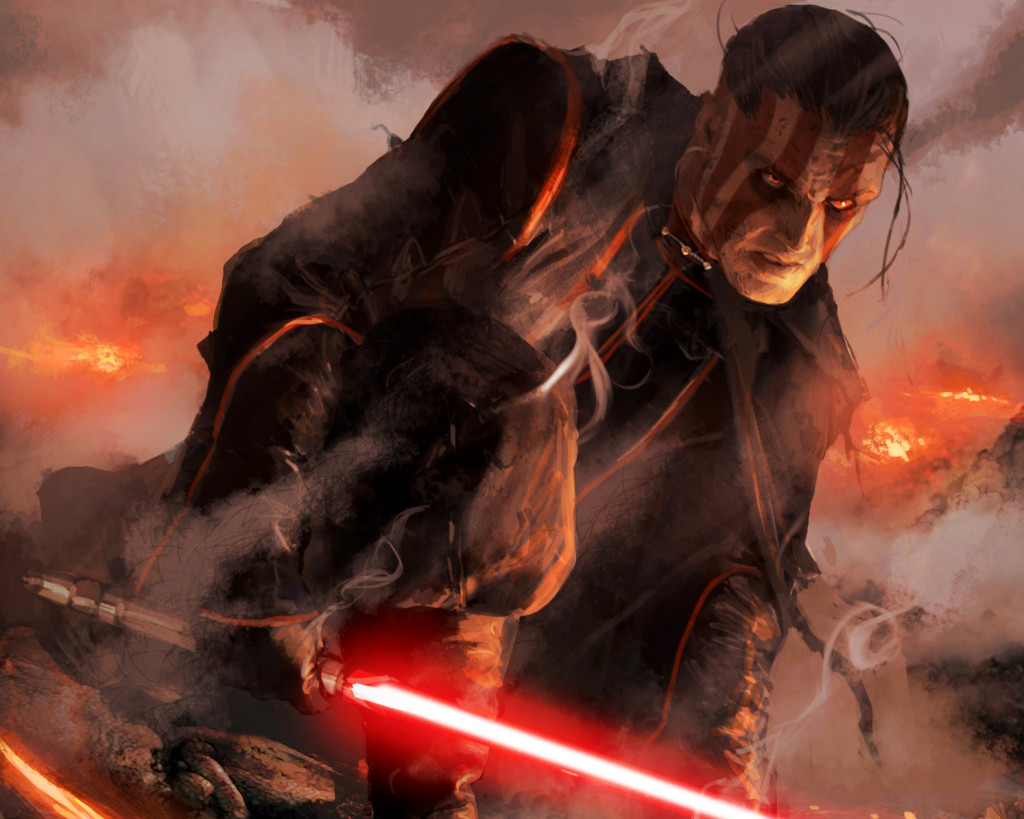Last year, in anticipation of the upcoming Star Wars films, I invited anyone who wanted to send in their own Star Wars script to do so. I would review the Top 5 and if one was really awesome, who knows, Disney might see it and get the writer involved in a future installment of the series. I received 20 Star Wars scripts in total. This week I’m reviewing the best of those. Monday we got Old Weapons. Tuesday we had rising shadows. Wednesday we had the most badass lobster in the galaxy. Thursday we had lots of children. And for our final Star Wars entry, we’ve got RELIGION!
Genre: Sci-fi Fantasy
Premise: (from me) A thousand years after the fall of the Empire, a dangerous new Jedi Master named Rivada has found a way to weaken those with the Force, and will stop at nothing to facilitate this new power.
About: Robert is a super nice guy who’s actually been reviewed on the site before in a drama-filled (okay, I’m exaggerating for effect) debate on if it’s okay to write 140+ page scripts. It’s been a couple of years since then, however, and one would presume he’s improved considerably. Indeed, the page count of his latest entry is a paltry 109 pages, so I expect good things!
Writer: Robert Cornero
Details: 109 pages
There seems to be two trains of thought when it comes to these Star Wars entries: Stick with the original characters a few years after Episode 6, or (as Robert does), fast-forward hundreds of years into the future and create a new cast.
Let me offer my feelings on the matter (if I may – and I will). When I heard they were bringing back Han for the new film (as well as Luke and Leia), I didn’t like it. Mainly because 70 year-old, wise-cracking scoundrels aren’t very cool. I had the same issue with that fourth Indiana Jones film. You can continue to play that cool franchise character you established as a young actor until maybe around 50. After that, it starts looking desperate. And more importantly, weird. I mean, now we have to prepare for a 70 year-old Arnold in a Terminator film? I pay my social security taxes and am all for assisted living, but at a certain point these actors have to embrace age-appropriate roles.
Apparently, Robert Cornero agrees with me because he said adios to Harrison, Red Foxx, and Betty White, and embraced an entirely new cast. How did that cast do? Well, I can tell you this. Of the five entries this week, Secrets of the Ancients was definitely the most heady and spiritual of the bunch. If you want to give your thinking cap a workout, today’s Star Wars script is the entry to go with.
As we’ve established, it’s a thousand years after Endor’s clean-up party and the Jedis are officially back in business. Well, sort of. See, there’s a new Jedi trending on Twitter named Rivada, who’s got this juicy plan where he’s going to suck away the Force Powers of all the other Jedi out there and probably become the most powerful Jedi ever as a result.
A few parsecs away, another Jedi named Aurius is the only person standing in the way of Rivada achieving this. He’s stolen the possible coordinates to the previously hidden Sea of Ages, where the majority of the Force in the universe is concentrated. If the wrong guy were to get to that Sea, who knows what could happen.
But Aurius can’t do this alone, which is why he locates his old apprentice, Khalia, and asks her to tag along. Khalia used to be a rising padawan until she lost interest, got out of Dodge. But when Aurius starts saying stuff like the Galaxy will be taken over and the Empire will rise again – well, Khalia becomes open to listening.
But finding the Sea isn’t as easy as advertised. They have to travel to Coruscant, request the help of a Jedi who hates Aurius, all with Rivada hot on their trail. Khalia finally starts connecting with the Force again, which allows her to find this sacred “Sea,” but when she gets there, she sees that Rivada is ready to do anything to have it himself. Let the light-saber battles begin!
Secrets of the Ancients is less about plot, and more about the spiritual underpinnings of the Force itself. Gone are big bulky Death Stars. In their place are meta-physical ground Zeroes that bind the universe together. Even the names we encounter seem to be speaking to a different plane of existence. The “Sea of Ages,” which is located in the “Temple of Bal-Shur.”
We have Khalia communicating with dead monks via astral-projection, sending her sleeping soul billions of miles away for a little Karma chameleon phone call. It’s all rather trippy and reminded me in some ways of the famous Leigh Brackett draft of Empire Strikes Back (which, in one scene, had Luke and Darth Vader fighting a light saber battle literally in the middle of space). We got a little Wachowski philosophizing in this one, for better or worse.
So did it work? Well, it certainly added a lot more depth to the mythology, which is something I haven’t seen a whole lot of this week. But there was no doubt it came at the expense of some fun. I think of Star Wars as a rip-roaring space adventure. Slow it down too much and it stops being Star Wars. There were a handful of times where I was astral-projecting my thoughts at Robert, telling him to “keep it moving!” Not sure if he heard them.
Character-wise, we have a mixed bag here. The most interesting character is Aurius. He’s a “good” Jedi who wants to take down the “bad” Rivalda, but he’s not a choir boy. He’s killed a couple of good Jedis himself. In his mind, if it means saving the universe, he’s not afraid to shed some blood. I liked that about him. It brought out the grey in the character. Call him the “Riddick” of Jedis.
Unfortunately, I was never clear on who Khalia was. I didn’t entirely understand her backstory. I think she used to be an apprentice on Coruscant. Then some major catastrophe happened. She abandoned the Jedi as a result, and resorted to farming back on her home planet.
So she was someone who was already a Jedi, kind of forgot how to be a Jedi, and now she has to re-learn how to be a Jedi? Doesn’t have the same punch as a total underdog nobody (Luke) having to learn the Force from scratch, does it?
You know who Kahlia reminded me of? Christopher McQuarrie’s Clark Kent. How instead of starting with Superman, we had this weird half-backstory about how Superman had already been Superman but then left Earth for awhile, only to come back and not want to be Superman. It was totally unnecessarily complicated. That was Khalia to me. I think she should’ve been a nobody, like Luke. Not only does it make her easier to buy into, but she just would’ve been easier to identify with since she would’ve been more like us (nobodies!).
I will say that I liked this whole “Center of the Universe” Force place, and I actually wanted to see Robert do more with it. Here’s a place where all the Force in the Galaxy is concentrated. Imagine two Jedis fighting in a place like that. What they could do with all that power. It would make that Yoda-Dookoo fight look like Pong. I was hoping Robert was going to push the envelope with all that power and get really imaginative, but it didn’t happen. ☹
What we haven’t talked about all week is villains – which is ironic since much of Star Wars’s success is attributed to its villain. Looking back at it, why IS Darth Vader the greatest villain of all time? Is it his badass outfit, cool breathing apparatus, and distinguished voice? Or is there something written into him that makes him stand above all the competition?
Cause if you look at him objectively, he’s just a badass dude who doesn’t take shit. He can force choke you. He can dangle choke you. And he has some history with another Jedi (Obi-Wan Kenobi). But he’s not a nuanced complicated layered bad guy in the vein of Hannibal Lecter. Well, if you’re only going off the first Star Wars film, that is.
I don’t know what makes Vader so great. Maybe you guys can help me with that one. But what I can tell you is that no one came close to writing a memorable Star Wars villain this week. Every bad guy was either bland, predictable or both. I think one of the things you’re looking for in a villain is “something different,” something you weren’t expecting to see. And everyone here was just a garden variety Jedi with galaxy-domination on his/her mind. I needed more than that. Makes me think I should write an article about villains soon.
But yeah, at the very least you have to start with a character that’s defined. An easy way to tell if your villain (or any character) is hitting the reader is to ask them, “If there’s one defining trait you’d label my villain as, what would it be?” If they have a hard time answering, you didn’t do your job. And if Robert were to ask me that question about Rivada, I’d have a hard time answering it. At least with Aurius, I knew he’d do anything to get the job done, moral or not. He felt like he had a solid foundation under him. Rivada? I’m still trying to figure anything that sticks out about him. Thoughts?
So what have I learned from this week’s experience? Well, it’s really hard to write a Star Wars script. That’s number 1. But honestly? Probably that whatever you’re writing, whether it be your own spec or an assignment for a major studio franchise, you have to come to it with your own take. You have to create your own story, your own characters. If all you’re doing is resting on the laurels of what came before you, your script is going to come off as lazy and uninspired. You have to at least TRY to infuse your own voice and ideas into it. While nobody knocked it out of the park this week, the scripts were almost always the most fun when the writers were trying something different and blazing their own trails.
Script link: Secrets of the Ancients
[ ] what the hell did I just read?
[x] wasn’t for me
[ ] worth the read
[ ] impressive
[ ] genius
What I learned: Something occurred to me while I was thinking about all six Star Wars films today. The movies were always at their best when the characters wanted to be anywhere BUT where they were. From Luke wanting off Tatooine, to the group wanting out of the Mos Eisley, to the group wanting off the Death Star. It reminded me that stories are often the most interesting when you put your characters in places they don’t want to be.



